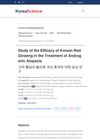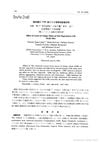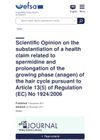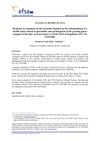 67 citations
,
November 2019 in “Molecules”
67 citations
,
November 2019 in “Molecules” Tea, especially green tea, shows promise in cosmetics for skin and hair benefits but more research is needed for effective use.
 8 citations
,
June 2019 in “Journal of Ginseng Research”
8 citations
,
June 2019 in “Journal of Ginseng Research” Gintonin-enriched fraction promotes hair growth and could be a potential alopecia treatment.
 3 citations
,
May 2019 in “Journal of Cosmetic Dermatology”
3 citations
,
May 2019 in “Journal of Cosmetic Dermatology” Miliacin with polar lipids helps hair growth and improves hair loss in women.
 52 citations
,
September 2018 in “International Journal of Molecular Sciences”
52 citations
,
September 2018 in “International Journal of Molecular Sciences” Ginseng and its compounds may help hair growth and prevent hair loss, but more human trials are needed to confirm this.
4 citations
,
February 2018 in “PubMed” Green tea hair tonic safely and effectively reduces scalp greasiness.
 9 citations
,
January 2018 in “BioMed Research International”
9 citations
,
January 2018 in “BioMed Research International” Tetrahydroxystilbene Glucoside may help prevent hair loss by blocking certain pathways that lead to cell death.
 145 citations
,
November 2017 in “Journal of The European Academy of Dermatology and Venereology”
145 citations
,
November 2017 in “Journal of The European Academy of Dermatology and Venereology” Use minoxidil for hair loss treatment; assess results after 6 months.
 8 citations
,
October 2017 in “Dermatology practical & conceptual”
8 citations
,
October 2017 in “Dermatology practical & conceptual” A spermidine-based supplement may help hair grow longer by keeping it in the growth phase.
 25 citations
,
November 2015 in “Journal of Ethnopharmacology”
25 citations
,
November 2015 in “Journal of Ethnopharmacology” Certain Chinese herbs, especially Cacumen platycladi, can promote hair regrowth and reduce hair loss-related hormone levels in mice.
 19 citations
,
July 2015 in “Journal of Ginseng Research”
19 citations
,
July 2015 in “Journal of Ginseng Research” Korean Red Ginseng may protect against hair loss caused by chemotherapy.
 93 citations
,
February 2015 in “Journal of Investigative Dermatology”
93 citations
,
February 2015 in “Journal of Investigative Dermatology” Oxidative stress affects hair loss in men with androgenetic alopecia.
 49 citations
,
November 2014 in “Journal of Medicinal Food”
49 citations
,
November 2014 in “Journal of Medicinal Food” Red Ginseng Extract may help human hair grow by activating growth pathways and blocking negative effects of certain hormones.
 14 citations
,
January 2014 in “International Journal of Dermatology”
14 citations
,
January 2014 in “International Journal of Dermatology” Minoxidil with Korean red ginseng improves hair density and thickness more than minoxidil alone.
17 citations
,
January 2014 in “The American journal of Chinese medicine” Angelica sinensis may help regrow hair by blocking certain cell death signals.
 15 citations
,
December 2013
15 citations
,
December 2013 Men with more vanadium in their blood and who drink less soy milk are more likely to have hair loss.
 24 citations
,
October 2012 in “Journal of Ginseng Research”
24 citations
,
October 2012 in “Journal of Ginseng Research” Korean Red Ginseng may help improve hair regrowth when used with corticosteroid injections for Alopecia Areata.
 51 citations
,
October 2012 in “International Journal of Immunopathology and Pharmacology”
51 citations
,
October 2012 in “International Journal of Immunopathology and Pharmacology” Finasteride works better than Serenoa repens for male hair loss.
 198 citations
,
October 2011 in “Journal der Deutschen Dermatologischen Gesellschaft”
198 citations
,
October 2011 in “Journal der Deutschen Dermatologischen Gesellschaft” Use minoxidil for hair loss; finasteride and dutasteride for men, dutasteride for women.
 10 citations
,
January 2010 in “PubMed”
10 citations
,
January 2010 in “PubMed” Adjuvants, diet changes, and laser therapy may improve male pattern hair loss.
 25 citations
,
September 2009 in “Journal of Ginseng Research”
25 citations
,
September 2009 in “Journal of Ginseng Research” Korean red ginseng can significantly increase hair density and thickness in people with androgenic alopecia.
 121 citations
,
May 2009 in “Journal of Ethnopharmacology”
121 citations
,
May 2009 in “Journal of Ethnopharmacology” Eclipta alba extract may help hair grow similarly to Minoxidil.
 63 citations
,
August 2008 in “Journal of Cosmetic Dermatology”
63 citations
,
August 2008 in “Journal of Cosmetic Dermatology” Cuscuta reflexa extract may help treat hair loss caused by hormones.
 98 citations
,
May 2008 in “Archives of Dermatological Research”
98 citations
,
May 2008 in “Archives of Dermatological Research” Eclipta alba extract helps hair grow faster and more effectively than minoxidil in rats.
68 citations
,
January 2008 in “Clinics in dermatology” Siddha medicine uses herbs and minerals to safely treat skin diseases like psoriasis and eczema.
 67 citations
,
May 2007 in “Journal of Cosmetic Dermatology”
67 citations
,
May 2007 in “Journal of Cosmetic Dermatology” The herbal formulation promoted hair growth faster and more effectively than minoxidil in rats.
 41 citations
,
March 2007 in “Journal of dermatological science”
41 citations
,
March 2007 in “Journal of dermatological science” Taking L-cystine and vitamin B6 can prevent hair loss caused by smoke in mice.
114 citations
,
January 2007 in “International Journal of Dermatology” Caffeine can stimulate hair growth and counteract testosterone's suppressive effects on hair follicles.
 47 citations
,
December 2006 in “Therapy”
47 citations
,
December 2006 in “Therapy” The dietary supplement helped increase hair growth in women with hair loss.
 108 citations
,
November 2006 in “Phytomedicine”
108 citations
,
November 2006 in “Phytomedicine” Green tea component EGCG could potentially promote human hair growth.
10 citations
,
January 2004 in “PubMed” Radiation increases cell death in hair follicles, but certain treatments can protect against this effect.
The combination of millet seed extract, L-cystine, and calcium pantothenate significantly improved hair growth in women with female pattern hair loss.
 139 citations
,
October 1999 in “Environmental Health Perspectives”
139 citations
,
October 1999 in “Environmental Health Perspectives” Modern science supports the use of some Ayurvedic plants for health, as ancient practices suggested.
23 citations
,
June 1993 in “PubMed” Medication 1 improved hair quality and growth more effectively than medication 2 and the placebo.
 37 citations
,
January 1993 in “Yakugaku zasshi”
37 citations
,
January 1993 in “Yakugaku zasshi” Ginkgo biloba leaf extract may help hair regrowth and improve heart health.
16 citations
,
August 1989 in “PubMed” Retinol and L-cystine improve diffuse hair loss without side effects.
 121 citations
,
March 1989 in “Journal of Investigative Dermatology”
121 citations
,
March 1989 in “Journal of Investigative Dermatology” Minoxidil can help grow hair in mice by making cells grow and improving hair quality. More research needed.






























